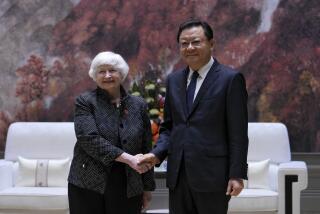Ivanka Trump leads U.S. condemnation of China and other countries for human trafficking
Reporting from Washington — Ivanka Trump led U.S. condemnation Tuesday of China and several other countries for failing to fight the scourge of international human trafficking, the 21st century version of slavery, marking a shift for a White House sometimes accused of indifference to human rights.
In the State Department’s annual report on a problem said to enslave 20 million people worldwide, China was downgraded to the third and worst category of offenders.
Secretary of State Rex Tillerson told reporters that Chinese companies use tens of thousands of North Koreans who are forced into labor and rarely paid. Their salaries instead go to the North Korean government, he said.
China “has not taken serious steps to end its own complicity in trafficking,” Tillerson said. He called on U.S. companies to ensure their Chinese suppliers don’t employ forced labor.
It marks the first time the Trump administration has publicly rebuked China’s human rights record. Except for criticism of Cuba, it is a rare instance when the administration has highlighted a global human rights abuse at all.
President Trump has not publicly raised human rights as a U.S. concern in his meetings or phone calls with a series of friendly autocrats — including the leaders of Egypt, Turkey and the Philippines — who have jailed opponents, muzzled the press or curbed civil liberties.
But Ivanka Trump, the president’s elder daughter, has expressed deep concerns about human trafficking, in which men, women and children are traded and sold as workers or sex slaves, and Tuesday’s report was released with considerable pomp.
She joined Tillerson for an elaborate ceremony in the ornate Benjamin Franklin Hall of the State Department. Several hundred people applauded as seven on stage were honored for their work fighting the illegal practice.
No one mentioned that parts of Ivanka Trump’s clothing line are produced in China. In Ganzhou, three Chinese activists investigating working conditions at factories that made shoes for her brand were arrested last month, according to human rights groups.
In brief remarks, Ivanka Trump decried the “ugly stain on civilization” of modern slavery, “a pervasive human rights issue affecting millions, regardless of gender or nationality, and often profoundly secret.”
The fanfare contrasted sharply with the State Department’s low-key release in March of its annual human rights survey, an exhaustive look at practices in nearly 200 countries.
Tillerson broke with recent predecessors when he did not appear at a news conference to issue the report, an absence widely noted by human rights groups.
He instead wrote a brief introduction, and a lower State Department official answered reporters’ questions anonymously. There was no ceremony.
The contrast with Tuesday’s high-profile event suggests concerns over human trafficking could take precedence over a broader human rights strategy.
Some independent human rights groups saw weakening in this year’s report, noting that Iraq and Myanmar were removed from a list of countries that rely on child soldiers.
“Taking [Myanmar] and Iraq off the list when they continue to use child soldiers is both contrary to U.S. law and harms children still in the ranks,” Jo Becker, children’s advocacy director at the New York-based Human Rights Watch, said in a statement.
Tillerson singled out China for special criticism, pointing to its use of “forced laborers from North Korea.”
“Their pay does not come to them directly,” he added. “It goes to the [government in Pyongyang], which confiscates most of that, obviously.”
President Trump has been especially friendly toward Chinese President Xi Jinping, but recently expressed frustration over what he described as Beijing’s failure to curb North Korea’s ballistic missile and nuclear weapons programs.
Criticizing Beijing now may be a negotiating tactic, a way to apply more pressure on Beijing to act against North Korea, analysts said.
Susan Coppedge, the U.S. ambassador at large for the fight against human trafficking, said China was also guilty of other abuses, included forced incarceration of people at drug-rehabilitation centers, indentured children at factories, and forced prostitution.
“Forced labor in China is not one-dimensional,” she said.
Officials in Beijing, reacting to the report, said China had made great strides in a “resolute” fight against illegal trafficking.
“No country has the right to speak irresponsibly on China’s domestic affairs,” Foreign Ministry spokesman Lu Kang told reporters.
Until now, China was on a “Tier 2 watchlist” with warnings it needed to do more to improve conditions. It instead dropped to Tier 3 this year, a designation that in theory could trigger sanctions.
In all, 36 countries were listed on Tier 1, 80 on Tier 2 (including 45 on the watch list), and 23 on Tier 3. Some 21 countries dropped a level, and 27 were given higher marks.
For more on international affairs, follow @TracyKWilkinson on Twitter
More to Read
Sign up for Essential California
The most important California stories and recommendations in your inbox every morning.
You may occasionally receive promotional content from the Los Angeles Times.











